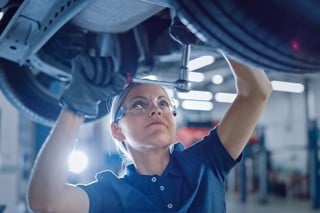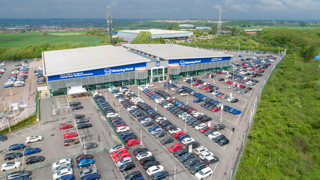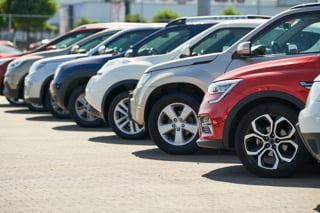Marshall Motor Holdings is by far the biggest, consisting of 42 franchised dealerships, a leasing division, Therma King refrigeration and VTR tail lift repairs.
The second, Specialist Vehicles, is relatively small, and the property company which manages Marshall’s extensive interests is the third component.
The fourth division is the most unexpected: Aerospace. Marshall has been involved since 1929 when founder David Marshall opened the first Cambridge Aerodrome. It owns the City of Cambridge airport, modifies and services planes for the RAF, and trains pilots. Arthur Marshall, son of the founder, is credited with playing a significant role in the Second World War following the introduction of his revolutionary ‘Ab Initio’ flying training scheme, which enables people to learn to fly within 14 weeks. It was adopted by the RAF in 1941 and is still used today.
Motor Holdings will turn over £550m this year (2004: £388m), compared to just over £100m from the other three divisions. Given the impressive year-on-year increase in turnover, it’s clearly an expanding business. And the focus has recently shifted away from the Cambridgeshire heartland to opportunities elsewhere in the UK.
“We’re keen to increase the specialist part of our franchise mix,” says chief executive Roger Knight, who also sits on the main board, alongside high profile non-executives like IMI chief executive Sarah Sillars. “There are lots of opportunities – we’re considering half a dozen things now,” he says.
BMW, Mercedes-Benz (Marshall sold its sites during the network shake-up three years ago), VW and Audi are on the wanted list, although Knight stresses he’ll make no approaches without carmaker approval.
Last year the group inched into Lincolnshire with the purchase of a Volvo dealership from TMS, signalling a U-turn for the regional business. Nowhere is off-limits, according to Knight. “We will go anywhere in the UK with the right franchise – that’s a new position for us.”
The volte-face is possibly caused by a lack of real opportunity for growth in Marshall’s existing area of influence, especially with preferred partners. And it recognises the need for growth in order to maintain its position among the leading regional forces. By 2009, the group’s centenary year, Marshall Motor Holdings wants 60 sites.
Two propositions appeal: a single site premium franchise or a cluster of three or four sites for a volume brand, but only if they help achieve the two-year target of a 2% return on sales – and that’s for each dealership as well as the group as a whole.
“We’re not a million miles from achieving that target; we’re around average for our franchise mix,” says Knight. “But we’re looking closely at each franchise to see if they will meet this target in the future – if we feel they won’t, then we will get out.
“There will be a lot more consolidation in the market with independents deciding to get out. It’s not just due to pressure from the groups, but also manufacturer standards and investment versus likely returns,” he adds. “You have to have an effective, well run business to get the returns. “But even then, smaller companies either don’t have the cash to invest in premises and equipment or they’ve never had to do it before and can’t see why they should.”
Exacerbating the situation is the difficult new car market. Sales for the first four months are down 6.6%, with retail particularly badly hit due to uncertainty over interest rates (now seemingly stable at 4.75%) and house prices. Knight shares the generally held view that the market will pick up in the second half of the year.
Headhunted from Henlys in 1989, Knight joined Marshall Motor Holdings as a regional director. “It’s a great business. We run it in the way that the group has been developed, focusing on the ‘Marshall Way’ philosophy, which is courtesy, efficiency and integrity,” he says.
“If the chairman had a choice between a happy customer or making a profit on that individual, he’d choose the happy customer. That is the way this company has grown and it has given us a long-term, strong business.”
The consideration to customer service was manifested in Marshall’s decision to launch a self-funded warranty programme for MG Rover customers, supplanting the collapsed carmaker’s policy. It’s a significant commitment for the group: it has a three-year car parc of 3,000 owners.
“This is an investment in the future – we’re spending money on the warranty instead of on a marketing campaign or customer loyalty plan,” says Knight, who was a Rover area manager in the late 1980s.
He takes a dim view of the manufacturers’ collective emphasis on customer satisfaction indices (CSI), claiming they are unnecessarily complicated, and will be launching Marshall’s own CSI next year.
“The only question we need to ask is ‘will you recommend us to your friends and family?’. If the customer says yes, then we have got the service right,” says Knight.
“The manufacturers are also starting to recognise that CSI has not moved the industry on. It’s time for something new.”
The analyst’s view
One city analyst, who asked not to be named, believes the Marshall car retail business is “pretty strong”, but he believes it needs to take greater advantage of its dominance in the Cambridgeshire region.
“The problem is it’s part of a group with other interests, and the Marshall family tends to focus on the aerospace and property divisions,” he says. “The business seems to be always on the acquisition trail, but never buys anything. It tends to take a conservative view of life, and always has a lot of money tucked away in the bank.
“Marshall has strong local control and needs to move forward on the geographic concentration front – it needs to reflect its dominance in the region and that will bring better margins and profits.”
How Marshall's turnover has grown (AM100 figures)

There's been gradual growth between 1999 and 2004, but this year MMH expects a huge increase on the back of aftersales business, relocation of key sites and acquisitions.
The business
Name: Marshall Motor Holdings
Founded: 1909
Turnover: £550m (2005 forecast)
No. of staff: 1,700
No. of sites: 42
New car sales: 12,250 (AM100 2004)
Used car sales: 9,810 (AM100 2004)
Main franchises: Chrysler, Citroen, Honda, Jaguar, Land Rover, Mitsubishi, Nissan, Peugeot, Seat, Skoda, Toyota, Vauxhall, Volvo

















Login to comment
Comments
No comments have been made yet.